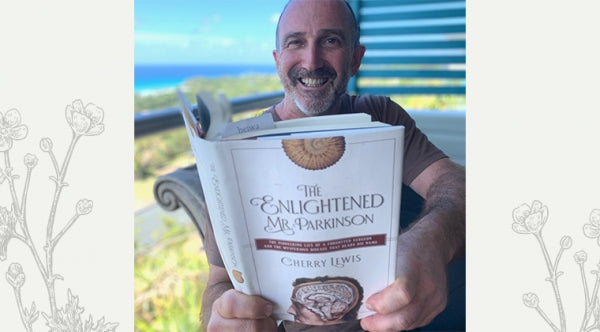Did you know the Japanese have a word for ‘a pile of unread books’? That word is tsundoku.
I have finally had a chance since pre-COVID-19 to have an entire week off. I have decided to unwind at my favourite local getaway: North Stradbroke Island.
I have also decided to do something about my tsunduko! Several years ago, I heard Cherry Lewis being interviewed on Radio National talking about the life and times of James Parkinson, whom after Parkinson’s disease is named.
I was fascinated and intrigued and wanted to learn more about this incredible person. I love reading historical biographies that document the history of medicine, and the 18th century was indeed an incredible period of transformation and enlightenment. I rushed out and bought the book in 2017, but have not had a chance to read it until now. Reading the book made me appreciate the incredible medical advancements we have made in the last 200 years.
Cherry Lewis recounts with such insight and clarity the remarkable life of James Parkinson in her book, The Enlightened Mr. Parkinson. Not only was Parkinson a highly respected surgeon and medical pioneer, he was politically outspoken. He also actively campaigned for changes and reforms to child labour and improvements to the atrocious conditions in asylums. Lewis has given us such incredible insight into an incredible person for whom I have come to admire and respect. 
Parkinson lived in a very turbulent, but exciting period in our history in the late 18th century. This was a period of upheaval, and London, where James Parkinson lived, was the epicentre of change as a result of The Industrial Revolution. In the period in which Parkinson lived, ‘mad’ King George III was on the throne. It was a reign dominated by the seven-year war (1756-1766), the American War of Independence (1775-1783) and the French Revolutionary Wars (1792-1802), which became the Napoleonic Wars (1803-1815). As a consequence, everything and everyone was highly taxed and civil discontent prevailed. Parkinson wrote more than two-thirds of every shilling earned was taken as taxes on the articles most necessary to support life.
In the 18th century, there were three types of medical practitioners: physicians, surgeons and apothecaries. There was a very clearly defined hierarchy, with apothecaries at the bottom and physicians at the top.
Fellows of the Royal College of Physicians had to have a medical degree from either Oxford or Cambridge. Lewis describes the physicians as an elitist group who provided healthcare to the rich and were forbidden to practice a ‘trade’ such as that of an apothecary, surgeon or man-midwife. Surgeons and apothecaries tended to pursue apprenticeships, but were largely unregulated until the Apothecaries Act of 1815. On completion of their apprenticeship, apothecaries could take an oral examination at the College of Surgeons, which qualified them to practice as apothecary surgeons. The apothecary’s original role was to prepare and dispense remedies prescribed by a physician in the same way that a pharmacist dispenses medications prescribed by a doctor nowadays. However, in Parkinson’s time, the apothecary would prescribe for minor ailments. Apothecaries were trained to recognise many plants, berries, roots, barks and minerals used on various remedies as well as how to prepare and prescribe them.
I was surprised to learn medical practitioners of the 18th century were still following the teachings of Hippocrates, who more than 2,000 years before, had promoted the doctrine of the four humours of the body: blood, phlegm, black bile and yellow bile. Disease was defined as an imbalance of these humours, and it was the role of the physician to bring the body’s humours back into balance. This often involved the use of blood-letting and the use of powerful purgatives.
At the age of 16, in 1771, James Parkinson followed in his father’s footsteps and began his seven-year apprenticeship as an apothecary for his father, eventually taking over his father’s practice when he died.
This was a period of radical political transformation as there was so much discontent amongst the majority of the population. To give you an idea, before 1831, only male owners of freeholds who paid more than 40 shillings a year in land tax were eligible to vote. This represented less than 2% of the population at the time. It is not surprising we saw the downtrodden populace in France become extremely restless and agitated, which resulted in the storming of the Bastille prison and the rest is history for King Louis XVI and his family.
There was much support for the French Revolution among Britain’s deprived working classes. It was at this time Parkinson attended a lecture given by a political activist who supported the French Revolution. Following this, Parkinson joined a secret society that advocated parliamentary representation for all men. Parkinson had a talent for writing and was soon involved in publishing ‘radical pamphlets’, which were considered an act of treason. One of Parkinson’s highly provocative pamphlets was titled, ‘Revolutions without Bloodshed’.
Parkinson and many of his colleagues were implicated in a plot to assassinate the King. Even though the Government never produced any evidence, the authorities were determined to supress any organisation that promoted liberal ideologies.
By the way, it was not until 1918 that the Representation of the People Act extended the vote to all men over the age of 21 and women over 30. In 1928, the universal suffrage was extended to women over the age of 21 years of age.
Parkinson was also very active in campaigning against child labour in the factories (often as young as 5 or 6). In the 1790’s, Parkinson oversaw significant improvement in the horrendous working conditions of children in factories, which often resulted in severe long-term and crippling injuries. He helped establish regulations governing child labour. However, would you believe, it was not until 1901 laws were passed that prohibited children under the age of 12 from working in factories.
Lewis also describes Parkinson’s work in an asylum. One of his duties was to assess if the patients were insane and if they should be admitted. He was appalled at the practices and questioned the definition of insanity at the time and made recommendations which lead to the Madhouse Act of 1774 being reformed.
In 1817, Parkinson wrote a treatise, An essay on the shaking palsy, in which he clearly articulated and documented the symptoms of Parkinson’s disease. However, he could not identify the cause. At the time, the condition was referred to as paralysis agitans.
It would not be until 1882 when French neurologist, Jean-Martin Charcot, used the term maladie de Parkinson to describe the condition we nowadays know as Parkinson’s disease. It was not until the 1950s that the neurological basis for Parkinson’s disease was identified.
Parkinson was a man ahead of his times and I am sincerely grateful to Cherry Lewis for restoring Parkinson to his rightful place in history.
I do look forward to sharing the potential role of using aromatherapy in the management of Parkinson’s disease in a future blog.
The Enlightened Mr. Parkinson
By Cherry Lewis
Published by Pegasus Books, New York, 2017.




